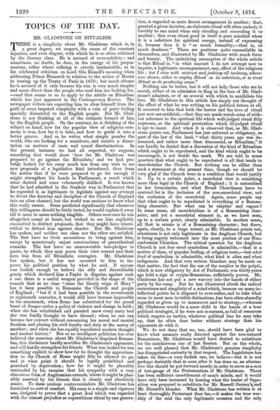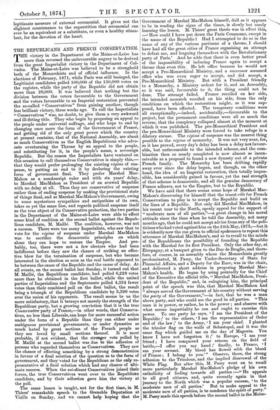TOPICS OF THE DAY.
MR. GLADSTONE ON RITUALISM.
THERE is a simplicity about Mr. Gladstone which is, in a great degree, we suspect, the cause of the constant injustice, and even disgust, with which he is so often criticised by the literary class. He is accused of over-subtlety ; and sometimes, no doubt, he does, in the energy of his prepos- sessions, refine where refining is utterly inadmissible, as in his celebrated criticism on Lord Odo Russell's meaning when addressing Prince Bismarck in relation to the action of Russia in tearing up the Treaty of Paris in 1870 ; but much oftener he.is accused of it only because his aim is very much simpler and more direct than the people who read him are looking for, —and that seems to us to apply to the article on Ritualism which has just appeared in the Contemporary Review. The newspaper writers are expecting him to clear himself from the guilt of some imputed complicity with a vein of party feeling specially distasteful to the English people. But Mr. Glad- stone is not thinking at all of the estimate formed of him by the English people. On the contrary, he is thinking of the subject on hand, how far the popular view of religious cere- mony is true, how far it is false, and how to guide it into a better groove. And so he writes what simply puzzles the world, who are looking for a manifesto, and receive a disser- tation on matters of taste and moral discrimination. In the present instance we had all expected, we suppose, something that would show how far Mr. Gladstone was prepared to go against the Ritualists,' and we had pro- bably looked for his essay much less from any wish to see new proposals of a legislative kind introduced, than from the notion that if he were prepared to go far enough it might strengthen his hands in Parliament, a result which some desired and some vehemently disliked. It was known that he had admitted in the frankest way in Parliament that he regarded it as legitimate to legislate against any attempt to divert the doctrine and discipline of the Church of England into an alien channel, but the world was anxious to know what this really meant. Some predicted significantly that whenever this willingness should be fairly tested, he would explain it away till it came to mean nothing tangible. Others were sure he was altogether sound at heart, but wished to see him explicitly committed to distinct proposals, that they might have where- withal to defend him against slander. But Mr. Gladstone has spoken, and neither one class nor the other are satisfied. The first have no fresh accusations to bring against him, except by monstrously unjust constructions of parenthetical remarks. The last have no unanswerable test-pledges to quote, by which they may prove their view correct and their hero free from all Ritualistic contagion. Mr. Gladstone has spoken, but it has not occurred to him to im- prove his political position by what he said. If anyone was foolish enough to believe the silly and discreditable gossip which declared him a Papist in disguise, against such a one there is a useful weapon provided in the shape of the remark that at no time " since the bloody reign of Mary " has it been possible to Romanise the Church and people of England ; " but if it had been possible in the seventeenth or eighteenth centuries, it would still have become impossible in the nineteenth, when Rome has substituted for the proud boast of Semper eadem a policy of violence and change in faith ; when she has refurbished and paraded anew every rusty tool she was fondly thought to have disused; when no one can become her convert without renouncing his moral and mental freedom and placing his civil loyalty and duty at the mercy of another ; and when she has equally repudiated modern thought and ancient history." But as no intelligent politician has ever believed the nonsense about Mr. Gladstone's disguised Roman- ism, this disclaimer hardly mortifies Mr. Gladstone's opponents, and will hardly strengthen his friends. What was looked for was something explicit to show how far he thought the approxima- tion to the Church of Rome might fitly be allowed to go, and at what point it should be legally prohibited and punished by deprivation ; how far it might be plausibly contended by his enemies that his sympathy with a very obnoxious form of Anglicanism extends, where it might be plau- sibly asserted by his friends that it clearly and absolutely ceases. To these anxious controversialists Mr. Gladstone has furnished no sort of comfort. His essay is a simple and vigorous one, designed to prove that a great deal which was regarded with the utmost prejudice as superstitious ritual by one genera- tion, is regarded as mere decent arrangement in another; that, granted a given doctrine, an elaborate ritual will often embody it forcibly to one mind when only clouding and concealing it to another ; that even ritual good in itself is pure mischief when it is a substitute for spiritual energy, instead of expressing it, because then it is " so much formality,—that is, so much deadness." These are positions quite unassailable in themselves, and illustrated by Mr. Gladstone with much force and beauty. The underlying assumption of the whole article is that Ritual is, "in what amount I do not attempt now to inquire, a legitimate accompaniment, nay, effect of the religious life ; but I view with mistrust and jealousy all tendency, where- ever shown, either to employ Ritual as its substitute, or to treat Ritual as its producing cause."
Nothing can be better but it will not help those who are in search, either of an admission to fling in the face of Mr. Glad- stone's admirers, or of an avowal with which to annihilate his foes. Mr. Gladstone in this article has simply not thought of the effect of what he was writing on his political future at all It occurred to him that both the horror and the love of ritual just now are artificial,—that they are made watch-cries of with- out reference to the spiritual life which well-judged ritual fitly expresses, or the spiritual prostration which ill-judged ritual is apt to cause. And when it is observed that, as Mr. Glad- stone points out, Parliament has just enforced as obligatory, as part of the law of the land, " what thirty years ago was de- nounced, and rather more than denounced, as Ritualism," it can hardly be denied that a discussion of the kind of Ritualism which ought to be reprobated, and the kind which ought to be encouraged, is not beside the mark. We are told in some quarters that what ought to be reprobated is all that tends to sacerdotalise the Church. But nothing can be sillier than such a statement at the present time, though we should be very glad if the Church were in a condition that would justify it. Up to a certain point, a sacerdotal view is something more than legal in the Church of England ; it is naturalised in her formularies, and what Broad Churchmen have to contend for is the inclusion of the non-sacerdotal view, not the exclusion of the sacerdotal. Again, some people say that what ought to be repudiated is everything of a Roman- ising character. But what can be emptier and vaguer ? In some sense, all sacerdotalism is of a Romanising char- acter, and yet a sacerdotal element is, as we have seen, up to a certain point, dearly admissible. In another sense, all that is ornate is of a Romanising character ; but there, again, clearly, to a large extent, as Mr. Gladstone points out, ornateness is not only legitimate in the Anglican Church, but is being eagerly welcomed into the most puritan of our Non- conformist Churches. The critical question for the Anglican Church is not how much symbolism is admissible,—that is a. matter of time, of popular feeling, of religious taste,—but what kind of symbolism is admissible, what kind is alien and what indigenous. And that very serious blunders may be made on that matter, the fact that the use of the surplice in the pulpit, which is now obligatory by Act of Parliament, was thirty years ago held a sign of crypto-Romanism, sufficiently proves. Mr.. Gladstone has not put a new war-cry into the hands of either party by his essay. But he has illustrated afresh the radical earnestness and simplicity of a mind which, because on many in- tellectual points he is disposed to over-refine, and to take what seem to most men invisible distinctions, has been often absurdly regarded as given up to manoeuvre and to strategy,—whereas Mr. Gladstone would be a mere child in the hands of a true political strategist, if he were not so earnest, so full of resources which require no tactics, whatever political line he may take up, that he often does better without strategy than his opponents do with it. We do not deny that we, too, should have been glad to know what measure really directed against the non-natural Romanisers, Mr. Gladstone would have desired to substitute for the mischievous one of last Session. But on the whole, we are well pleased that Mr. Gladstone's genuine simplicity has disappointed curiosity in that respect. The Legislature has taken its line—a very foolish one, we believe—but it is not perhaps desirable that so soon after it has done so, an alterna- tive line should be put forward merely in order to serve as a sort of test-gauge of the Protestantism of Mr. Gladstone. There has been sufficient unsettlement of men's minds, and it would have only been increased by hearing what the leader of Oppo- sition was prepared to substitute for Mr. Russell Gurney's, and Mr. Disraeli's blunder. What Mr. Gladstone has written is at least thoroughly Protestant thus far,—it makes the true wor- ship of the soul the only legitimate occasion and the only



































 Previous page
Previous page